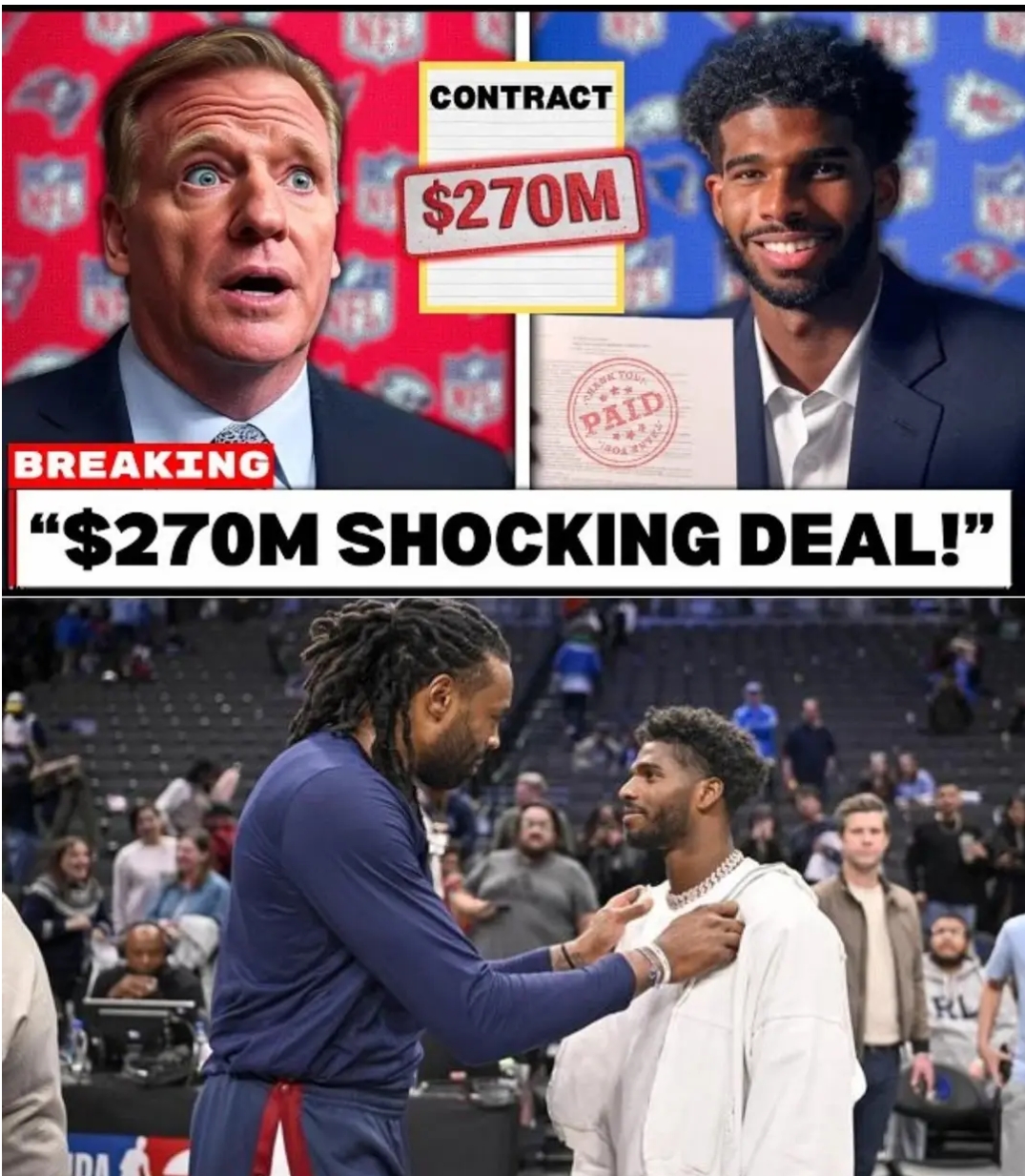CELEBRITY
Chaos Erupts Across NFL Ownership as Shedeur Sanders Sh0cks Football World With Stunning New Contract Outside the League – Insiders Reveal Explosive Backlash, Fear, and Unthinkable Consequences Ahead!

In the high-stakes world of the National Football League, where careers are forged and fortunes are made, the narrative is often predictable. Top draft picks sign colossal contracts, and late-round selections fight for a roster spot. But every so often, a story emerges that defies convention, shatters expectations, and threatens to rewrite the rules of the game. The story of Shedeur Sanders and his unprecedented contract with the Cleveland Browns is one such tale—a saga of strategic genius, alleged collusion, and a power shift so profound it has sent tremors through the core of professional sports.
When the 2024 NFL Draft concluded, the fact that Shedeur Sanders—a quarterback with a celebrated collegiate career and a name synonymous with football royalty—had fallen to the 144th overall pick was a shock in itself. Pundits and analysts, who had once projected him as a top-10 talent, were left scrambling for explanations. Was it his inconsistent deep ball? His tendency to hold onto the ball too long? Or were there other, more clandestine forces at play? The whispers of a systematic effort to keep Sanders out of the top rounds grew louder, but what came next would eclipse the draft-day drama entirely.
The Cleveland Browns, a franchise often associated with rebuilding and underdog narratives, became the unlikely stage for a contractual revolution. The deal they struck with Sanders was not just a contract; it was a masterclass in financial and personal empowerment. At its heart lies the “Prime Equity Clause,” a groundbreaking provision that grants Sanders a percentage—estimated to be between 5-6%—of all revenue generated from his name, image, and likeness. This includes merchandise, sponsorships, and any promotional activities tied to his personal brand. In an instant, a fifth-round rookie’s earnings potential was untethered from the constraints of a conventional salary.
The results were immediate and staggering. Reports indicate that Sanders’ jersey sales skyrocketed, reaching an astonishing $250 million. His commission from those sales alone netted him a cool $14 million, a figure that dwarfs the base salaries of most seasoned veterans, let alone a late-round rookie. This innovative clause was meticulously structured to be treated as business income, not a player’s salary, thus cleverly navigating the NFL’s stringent salary cap rules and the collective bargaining agreement. It was a checkmate move in a game of financial chess, and it left the league’s old guard reeling.
But the Prime Equity Clause was just one facet of this revolutionary deal. Sanders also secured full ownership and control over his personal media content and digital platforms. In an era where teams and leagues typically hold tight reins on player media, this was an unprecedented concession. It allowed his half-brother, Deion Sanders Jr., to gain special NFL approval to produce behind-the-scenes content, further building the Sanders brand and narrative on their own terms. This level of autonomy is a rarity in professional sports, and it signals a fundamental shift in the balance of power from the organization to the individual athlete.
When the dust settled, Shedeur Sanders’ estimated first-year compensation, including his equity earnings and endorsements, was projected to be between $18 and $37 million. This figure not only made him the highest-earning rookie in NFL history but also placed him among the league’s top earners, all from the humble position of a fifth-round draft pick. The message was clear: a player’s worth is no longer solely determined by their draft position, but by the power of their brand.
The controversy surrounding Sanders’ precipitous fall in the draft only adds another layer of intrigue to this story. High-profile figures like NFL legend Eric Dickerson and media personality Stephen A. Smith did not mince words, alleging systematic collusion among NFL teams to avoid drafting Sanders. They drew parallels to the contentious situation involving Colin Kaepernick, suggesting that Sanders was being punished for his family’s influence and his own unapologetic confidence. These allegations have since culminated in a $100 million lawsuit against the NFL, a legal battle that threatens to expose the inner workings of the league’s power structure.
The NFL establishment, predictably, has not been silent. Commissioner Roger Goodell has publicly expressed concerns over the precedent set by Sanders’ contract, fearing it could lead to inflated costs and a decentralization of control away from team owners. The contract has become a case study for player agents across the league, who are now undoubtedly looking for ways to replicate its success for their own clients. The fear within the league office is palpable: that the Sanders deal has opened Pandora’s box, and the traditional model of player compensation will never be the same.
This is more than just a story about money; it’s a story about a new era of athlete empowerment. Shedeur Sanders, with the guidance of his iconic father, Deion Sanders, has managed to do what many thought impossible. He has leveraged his brand, his talent, and his unshakeable self-belief to fundamentally alter the landscape of professional sports. His contract is a blueprint for future generations of athletes, a testament to the power of thinking outside the box and challenging the status quo.
The long-term implications of this deal are vast and far-reaching. Will we see more players demanding equity stakes in their teams’ revenue streams? Will personal brand management become as important as on-field performance? And how will the leagues, not just the NFL, adapt to this new reality? These are the questions that are now being debated in boardrooms and locker rooms across the country.
The story of Shedeur Sanders is a compelling reminder that in the world of professional sports, the game is not just played on the field. It is also played in the negotiation room, in the media, and in the court of public opinion. And in this particular game, Shedeur Sanders has proven himself to be not just a talented quarterback, but a visionary who has changed the rules of engagement for everyone. The NFL may be in a state of turmoil, but for the players, a new horizon of opportunity has just dawned












